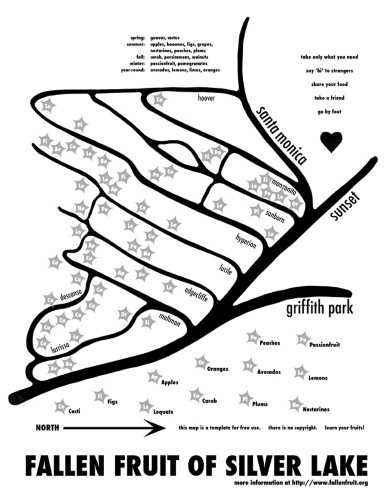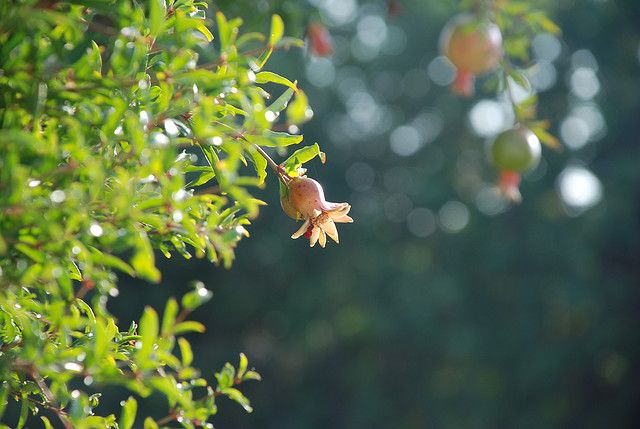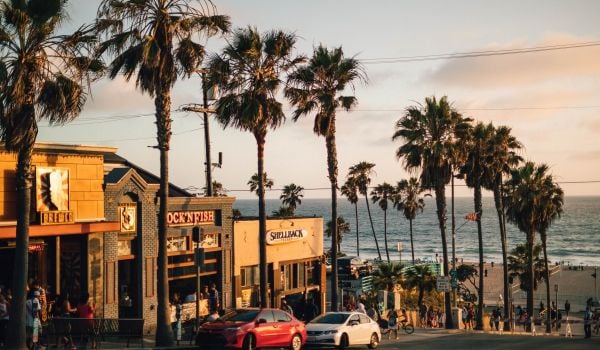Last week, in advance of their massive eatLACMA happening, City Culture featured words from and about the Los Angeles-based collaboration known as Fallen Fruit.
David Burns, Matias Viegener, and Austin Young make up Fallen Fruit. Their website describes the trio’s ongoing, long-term project thusly: “Using fruit as our lens, Fallen Fruit investigates urban space, ideas of neighborhood and new forms of located citizenship and community. From protests to proposals for new urban green spaces, we aim to reconfigure the relation between those who have resources and those who do not, to examine the nature of & in the city, and to investigate new, shared forms of land use and property.”
This week, City Culture presents a second harvest of the selected wit, wisdom, and observations of Burns, Viegener, and Young culled from a wide-ranging conversation held back during eatLACMA‘s early days and presented in no particular order below. 
David Burns: “The City [of Los Angeles] can’t cut down trees. So if a tree exists in a public space – if somebody does plant a beautiful apple tree on an avenue – then the City must maintain that tree.”
Matias Viegener: “The city has a mandate to preserve green space, so once it exists, they can’t remove it.”
Austin Young: “When we first did this, which was so long ago, we would ask everyone to hand-draw maps of their neighborhood…. We got people to look at the idea of having fruit on the streets of cities.”
Matias Viegener: “The next thing we discovered was the Fruit Jam – which was a way of using [fruit] in a very different public, communal, collaborative, experimental way. And also, the fruit tree adoptions. Karl Marx says the point of philosophy is not just to describe the world, it’s to change the world. We thought, ‘Let’s not just make maps, lets make this thing happen.’”
David Burns: “There is no definitive description or language to describe ‘the public’ or how the public is organized, or what the responsibility is to the idea of ‘public.’ We talk about ‘public fruit,’ so the idea of an object being owned by the public in a space that’s ill-defined becomes hard for a city or state to wrangle.”
Austin Young: “In each neighborhood, I’d have a ‘free’ booth where everyone puts their extra fruit. You could bring your lemons; take an avocado.”
David Burns: “Our favorite character is the stranger or passerby. That is our biggest hero in the world, the people you’ll never know.”
Matias Viegener: “One of the things we like to say is that you can’t wish away the problem. If the fruit is not harvested, it will attract rodents. So putting in a fruit tree establishes a certain obligation among the people who live nearby and these trees have to be taken care of by people or they shouldn’t exist. And they wouldn’t exist – fruit trees aren’t natural. They are created by humans.”
David Burns: “What [exists] in these neighborhoods, at least in Los Angeles, is the culture of cars and cell phones. Windshields and cell phones mediate an urban experience. If you’re walking on streets that have fruit trees on then, and someone’s standing around, you can talk to that person. For whatever reason, you now have permission. Because there’s a plum tree, I can now ask you a question.”
Matias Viegener: “We learned quickly that the object which we picked, which is fruit, is a very useful because it’s very ordinary. It’s easy to overlook. It’s universal. It exists in all cultures. It exists for all social classes. It is not coded in the way that so many things are coded in the world.”
Austin Young: “It’s completely non-polarizing. All it does is bring people together.”
David Burns: “One of our favorite things about the project is that it’s cross-generational. It has no positioning class boundaries. Everyone eats bananas.”
Read past City / Culture columns here. Email the columnist at lathinktank [at] gmail [dot] org.



_920_518_600_350_80_s_c1.jpg)












